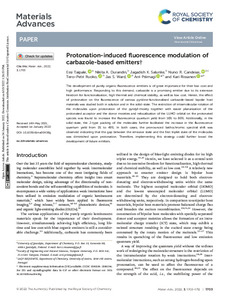Protonation-induced fluorescence modulation of carbazole-based emitters
Taipale, Essi; Durandin, Nikita A.; Salunke, Jagadish K.; Candeias, Nuno R.; Ruoko, Tero Petri; Ward, Jas S.; Priimagi, Arri; Rissanen, Kari (2022-02-07)
Taipale, Essi
Durandin, Nikita A.
Salunke, Jagadish K.
Candeias, Nuno R.
Ruoko, Tero Petri
Ward, Jas S.
Priimagi, Arri
Rissanen, Kari
07.02.2022
Julkaisun pysyvä osoite on
https://urn.fi/URN:NBN:fi:tuni-202206155677
https://urn.fi/URN:NBN:fi:tuni-202206155677
Kuvaus
Peer reviewed
Tiivistelmä
The development of purely organic fluorescence emitters is of great importance for their low cost and high performance. Responding to this demand, carbazole is a promising emitter due to its extensive freedom for functionalisation, high thermal and chemical stability, as well as low cost. Herein, the effect of protonation on the fluorescence of various pyridine-functionalised carbazole-based bipolar host materials was studied both in solution and in the solid-state. The restriction of intramolecular rotation of the molecules upon protonation of the pyridyl-moiety together with easier planarization of the protonated acceptor and the donor moieties and relocalisation of the LUMO orbital on the protonated species was found to increase the fluorescence quantum yield from 16% to 80%. Additionally, in the solid-state, the J-type packing of the molecules further facilitated the increase in the fluorescence quantum yield from 1% to 49%. In both cases, the pronounced bathochromic spectral shift was observed indicating that the gap between the emissive state and the first triplet state of the molecules was diminished upon protonation. Therefore, implementing this strategy could further boost the development of future emitters. This journal is
Kokoelmat
- TUNICRIS-julkaisut [16944]
